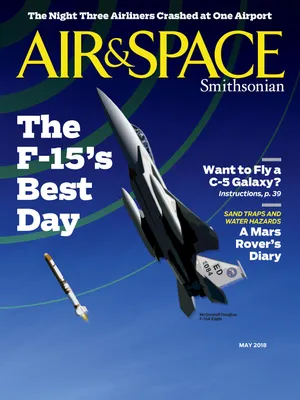Betting on the Moon
The odds of Neil Armstrong putting a boot on the moon were not good. One man put money on it anyway.
/https://tf-cmsv2-smithsonianmag-media.s3.amazonaws.com/filer/ba/f1/baf1025f-53a5-433d-a0a1-fc1f63db985b/18y_am2018_oo_spot_live-wr.jpg)
On April 10, 1964, 20-year-old British sci-fi fan David Threlfall placed the first wager of his life: £10 (just under a week’s pay, around $223 today) that U.S. President John F. Kennedy’s historic 1961 moon landing prediction (“before this decade is out…”) would come true. Threlfall’s was the first official wager in the Space Race, and the odds were not in his favor: Famous bookmakers William Hill allowed him odds of 1,000 to 1 “for any man, woman or child, from any nation on Earth, being on the Moon, or any other planet, star or heavenly body of comparable distance from Earth, before January, 1971.”
Once the media learned of his offbeat wager, lunar betting became wildly popular in the United Kingdom, where bookmakers routinely accept wagers on everything from election results to tomorrow’s weather. By year’s end, payoffs dropped to 100 to 1 (for the USSR’s space program) or 150 to 1 (for the U.S.), and as missions succeeded, the odds fell further. Uncrewed Luna 9’s soft landing in April 1966 spurred another flurry of moon bets at 8 to 1, and by Gemini 9’s flight that June, the odds further improved to 7 to 4.
What lunar bettors didn’t know was that NASA also gave the moon landing long odds. Only months before Threlfall’s wager, a NASA-commissioned risk assessment had forecast the chance of successfully fulfilling Kennedy’s decreed moon landing at just 1 in 20. Rather than let that get them down, NASA decided to keep assessing risk as they went, rather than try to reduce it at the start. The conviction that each launch improved the odds was based on the idea that constant learning would make performance improve, and let the U.S. lunar program continue.
With each space victory, reporters checked back with the man who’d launched the lunar-betting craze. “Few are rooting harder than David Threlfall,” newspapers read as Apollo 8 circled the moon on Christmas of 1968. “We took him on as a joke,” Hill’s spokesman bemoaned; “now it looks as if we shall lose.” As Apollo 11 lifted off on July 16, 1969, reporters asked how he’d spend his winnings. “Nassau, here I come!” he replied. By now, lunar betting had closed—though you could still wager 20 to 1 on astronauts reaching Mars.
Finally, on July 21, 1969, David Threlfall’s 1,000-to-1 wager paid off, transforming him into a front-page celebrity. Whisked to a TV studio in London, he and the staff there watched the live coverage of the moon landing. After the module landed but before Neil Armstrong’s famous first stride (“That’s good enough for us,” a Hill rep said), he was handed a check for £10,000—around a quarter-million dollars today. Though gracious in defeat and praising the astronauts, bookmakers across Britain mourned. “We paid out over £100,000,” a Hill spokesman later observed, “and were perhaps the only people not entirely delighted to see that particular feat of human exploration and ingenuity achieved.”
It later emerged that Apollo 11’s crew had informally ballparked their own odds before launch. “I thought we had a 90 percent chance of getting back safely to Earth,” Armstrong told interviewers on the flight’s 30th anniversary, “but only a 50-50 chance of making a landing on that first attempt.” Buzz Aldrin had it about there too. “I think we will escape with our skins,” Michael Collins wrote in a NASA history, “but I wouldn’t give better than even odds on a successful landing and return. There are just too many things that can go wrong.”
David Threlfall died in a car wreck in November 1970. But his faith in space travel lives on, and oddsmakers are still open to all kinds of space-related bets. Anyone game for a wager?
